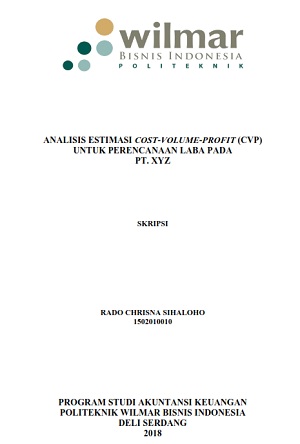Analisis Estimasi Cost-Volume-Profit (CVP) Untuk Perencanaan Laba Pada PT. XYZ
Abstract
Rado Chrisna Sihaloho, Akuntansi Keuangan, Analisis Estimasi Cost-Volume-Profit
(CVP) untuk Perencanaan Laba pada PT. XYZ.
Penelitian ini bertujuan untuk perhitungan dan perencanaan laba PT. XYZ secara
keseluruhan dengan menggunakan analisis Cost-Volume-Profit (CVP) untuk multi-product pada
tahun 2015-2017. Metode penelitian yang dipakai dalam penelitian ini adalah deskriptif
eskploratif. Data yang digunakan berasal dari hasil studi pustaka, observasi, dan wawancara pada
obyek penelitian. Metode analisis data yang digunakan adalah: (1) Mengklasifikasikan semua
biaya-biaya yang dikeluarkan perusahaan ke dalam biaya variabel (variable cost) dan biaya tetap
(fixed cost). (2) Analisis Break Event Point (BEP). (3) Menghitung Margin of Safety. (4) Dan
analisis perencanaan laba.
Berdasarkan hasil perhitungan analisis Cost-Volume-Profit (CVP), bahwa laba
menunjukkan bahwa PT. XYZ belum melakukan perencanaan laba dengan baik dilihat dari
tingkat laba yang dihasilkan dengan yang direncanakan agak jauh berbeda dan untuk tingkat
margin of safety (penjualan minimal perusahaan agar tidak mengalami kerugian) yang menurun
tidak terlalu jauh dari tahun ke tahun. Rado Chrisna Sihaloho, Financial Accounting, Estimation Analysis of Cost-Volume-
Profit (CVP) for Profit Planning in PT. XYZ.
This study aims to calculate and plan PT. XYZ's profit as a whole by using Cost-Volume-
Profit (CVP) analysis for multi-products in 2015-2017.
Research method in this study is using descriptive-explorative method. The data used comes from
the results of literature studies, observations, and interviews on the object of research. The data
analysis methods used in this study were: (1) Classify all costs incurred in the variable costs
(variable costs) and fixed costs (fixed costs). (2) Analysis of the Break Event Point (BEP). (3)
The calculation about Margin of Safety. (4) profit planning analysis.
Based on the calculation of Cost-Volume-Profit (CVP) analysis,it indicates that the PT.
XYZ has not done profit planning properly, seen from the level of profit generated with those that
are planned to be somewhat different and for the level of margin of safety (minimum sales of the
company to avoid losses) which is not too far from year to year.

